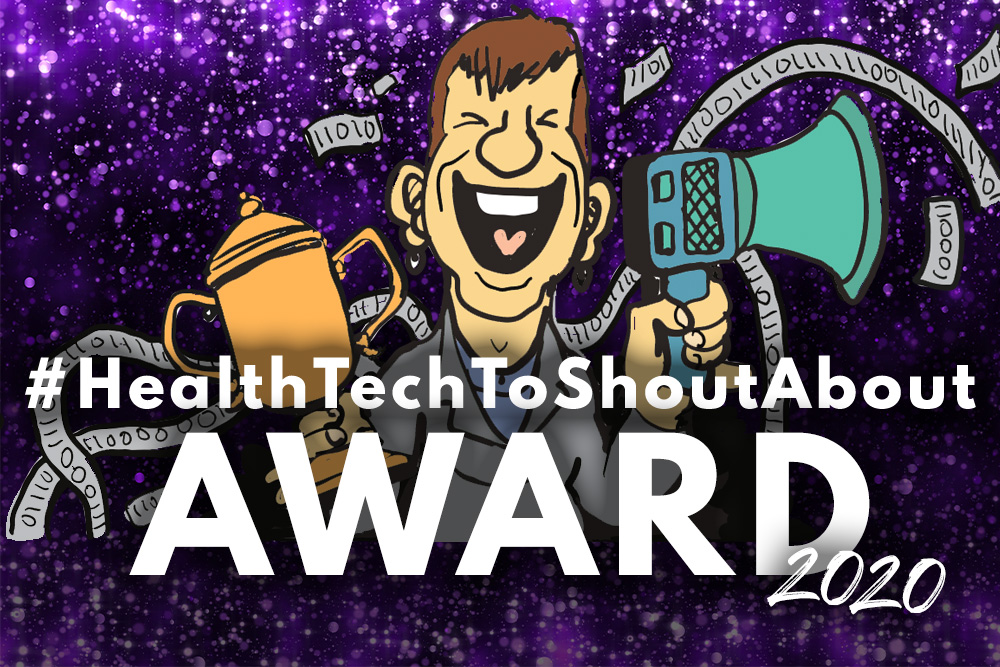This year’s HTN Awards attracted more than 120 entries. Highland Marketing’s independent advisory board whittled them down to a shortlist and then a winner for the #HealthTechToShoutAbout category. And that winner is…
This year’s HTN Awards attracted more than 120 entries; a significant increase on last year. It was no surprise that many of them addressed an aspect of the health tech response to the coronavirus crisis and highlighted the work done by companies and trusts to support clinicians and patients this spring.
However, for the #HealthTechToShoutAbout category sponsored by Highland Marketing, the judges were looking for something different. As Jeremy Nettle, chair of our independent advisory board and chair of the judging panel explained, they wanted to find projects that featured the application of new technologies to health and care that would have widespread applicability after the pandemic.
“What the Covid-focused entries really showed is that there is good, enterprise-level IT out there and that the NHS can adopt it when there is a pressing need, and the leadership and resources that tend to go with that,” he said. “What we wanted to find were the projects that will have an impact beyond the pandemic and that will benefit organisations get back into the NHS’ long-term reform agenda.”
A worthy shortlist and a great winner
A team at Highland Marketing went through all 120 entries and whittled them down to a longlist for the advisory board to consider. All the entries on the longlist were scored by four members of the board and, after some debate, a shortlist and winner selected.
So, without more ado, the shortlist (in alphabetical order by trust) was…
Leicestershire Partnership NHS Trust, ChatHealth:
A safe, secure messaging service that puts young people and patients/carers in touch with healthcare professionals. Used by schools and health visitors nationwide.
James Norman, healthcare CIO, EMEA, at DellEMC, said: “This is not new technology, but it has been deployed widely using an approach that works for staff. It has great take-up as a result.”
Jeremy Nettle said: “I like this simple form of communication / messaging that doesn’t place a big, new burden on clinicians and provides a simple way to triage and support patients.”
London Ambulance Service and Abbott: Online diagnostic ambulance: using online point of care testing devices within an ambulance or single responder setting, prior to hospital.
Cindy Fedell, a former ICS and trust CIO who has just moved to Canada,said: “This is a great initiative in the direction of ‘shift left’ and treat in the right place. This is a piece of partnership work between one trust and one company, but it should be replicable in other areas, because the kit and the interfaces are fairly standard.
“It’s easy to imagine where other diagnostic tools could be used and data sent, both to support care and secondary review.” Jeremy Nettle agreed: “Hopefully this can be replicated by other regional ambulance services and I hope that this has been discussed at that level.”
Mersey Care NHS Foundation Trust and Otsuka Health Solutions:
Integrating data sources through the MsST Covid-19 dashboard: a pilot focused on identifying and proactively managing the safety of those using secondary mental health services across Mersey Care.
Cindy Fedell said: “The concept of a dashboard is now new, but the use case and underlying data sources are uncommon. It’s also a step towards population health management, which is much talked about but not much used outside of primary care, where it tends to be restricted to very basic risk stratification. Pulling together data from multiple agencies is a very difficult thing to do, so this in itself is a big accomplishment and one that will further population health management in this sector.”
James Norman concurred: “The dashboard/scoring concept is not new, but this was a rapid piece of work with measurable impact that will be used to support joined up care in the future. It was also one of the few mental health entries – it would have been good to see more of them!”
Nottingham University Hospitals NHS Trust and DrDoctor:
Follow-up management enables patient to take greater control of their healthcare, providing the tools to report symptoms remotely from the comfort of their own home.
James Norman said:“DrDoctor has been around for a while now, but its ability to quickly develop solutions and use the latest technology to create a digital transfer, capture and decision process is what sets this entry apart. As all modern electronic medical records accept the HL7 or FHIR standard for data transfer, it should be possible for other trusts to replicate what Nottingham has done.”
Cindy Fedell said: “It’s easy to think that digital follow-up is now standard, but there are still plenty of trusts that have yet to implement it, and this shows why they should be moving in this direction. Covid has only made this more urgent.”
St Helens and Knowsley Teaching Hospitals NHS Trust and Refero:
Extending a telehealth and video consultation service to multiple departments, following a successful pilot in cancer drains outreach and stroke review services.
James Norman said: “The use of telehealth is not new and there are a number of providers on the market for the NHS to choose from. What sets this project aside is the take-up rate, which is verey challenging to achieve. It would be good to see this studied in the post-covid environment, to see if the take-up rate can be maintained. But this is great work that should be replicated elsewhere.”
Ravi Kumar, the entrepreneur chair of ZANEC Software Technologies, said: “Innovation in remote care management has huge potential for digital transformation in the NHS, so it is good to see a solution deployed that can demonstrate safety and efficacy.”
And our winner is…
Bolton NHS Foundation Trust and Qure.ai:
Applying AI in the fight against Covid-19. Bolton NHS Foundation Trust worked with Qure.ai to apply algorithms to chest x-rays in order to reduce turn-around times.
This was a piece of Covid-response work, introduced because it was taking 24-hours to turn around chest x-rays, which was too long for the images to be used as an effective diagnostic tool. But it was also the first in the UK deployment of a US product, a project that shows how AI can be used, now, to support health and care, and a piece of work with wider applicability.
Jeremy Nettle said: “By reducing turnaround times for x-rays, this project will have impacted on the care that clinicians were able to give to Covid-patients and, I hope, on outcomes for those patients. It certainly shows how AI can be used to improve systems and processes and that should be of great interest to other trusts that want to do the same. That makes it #HealthTechToShoutAbout.”
James Norman said: “There are AI companies with products on the market that can do the same, but the simplicity of the solution is what set this apart. More intelligent AI systems are being developed for imaging projects, so there will soon be a lot of competition in this space. But this is a great solution, deployed to meet a clear need, that points the way forward.”
Cindy Fedell said: “Finding effective uses for AI is something that everybody wants to do. This should be deployable across the country and reduce not just wait times but workload.”
Ravi Kumar said:“AI is a huge promise area for digital transformation in the NHS, especially when solutions have demonstrated safety and efficacy, so it was great to see this entry, which also addressed a very specific need during the Covid emergency.”



